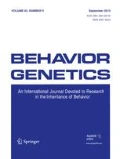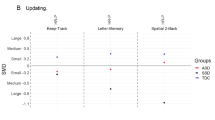Abstract
Tuberous sclerosis complex (TSC) is a genetic disorder associated with mTOR over-activation and disruption of MAPK, PI3K and AMPK signalling. Children with TSC have significant deficits on neuropsychological attention tasks, particularly dual tasking. Here we investigated attentional skills and related behaviours in daily life in normally intelligent adults with TSC and matched controls using the Test of Everyday Attention for Children (TEA-Ch) and the Attention-Deficit Scales for Adults (ADSA). No group differences were demonstrated on selective or sustained attention tasks carried out alone. However, adults with TSC performed significantly worse when these tasks were combined in a cross-modal dual task condition. On the ADSA the TSC group had significantly worse scores on several subscales (attention/concentration, behaviour/disorganization, academic and emotional behaviours) compared to controls and these correlated with dual task performance, indicating a clear impact of dual task deficits on attention-related behaviours in daily life. The presence or absence of epilepsy did not influence dual task performance or attention-deficits in daily life. Taken together with similar findings in children, results suggest that dual task difficulties are a core feature of the neuropsychological phenotype of TSC.


Similar content being viewed by others
References
Cohen J (1988) Statistical power analysis for the behavioural sciences, 2nd edn. Lawrence Erlbaum Associates, Hillsdale
Crino PB, Nathanson KL, Henske EP (2006) The tuberous sclerosis complex. N Engl J Med 355:1345–1356
Curatolo P, Bombardieri R, Jozwiak S (2008) Tuberous sclerosis. Lancet 372:657–668
de Vries PJ (2010) Neurodevelopmental, psychiatric and cognitive aspects of tuberous sclerosis complex. In: Kwiatkowski DJ, Whittemore VH, Thiele EA (eds) Tuberous sclerosis complex: genes, clinical features, and therapeutics. Wiley-VCH, Weinheim, pp 229–266
de Vries PJ, Howe CJ (2007) The tuberous sclerosis complex proteins: a GRIPP on cognition and neurodevelopment. Trends Mol Med 13:319–326
de Vries PJ, Hunt A, Bolton PF (2007) The psychopathologies of children and adolescents with tuberous sclerosis complex (TSC): a postal survey of UK families. Eur Child Adolesc Psychiatry 16:16–24
de Vries PJ, Prather PA (2007) The tuberous sclerosis complex. N Engl J Med 356:92–94
de Vries PJ, Watson P (2008) Attention deficits in tuberous sclerosis complex (TSC): rethinking the pathways to end state. J Intellect Disabil Res 52:848–857
de Vries PJ, Humphrey A, McCartney D, Prather P, Bolton P, Hunt A (2005) Consensus clinical guidelines for the assessment of cognitive and behavioural problems in tuberous sclerosis. Eur Child Adolesc Psychiatry 14:183–190
de Vries PJ, Gardiner J, Bolton PF (2009) Neuropsychological attention deficits in tuberous sclerosis complex (TSC). Am J Med Genet 149A:387–395
Ehninger D, Silva AJ (2011) Increased levels of anxiety-related behaviors in a Tsc2 dominant negative transgenic mouse model of tuberous sclerosis. Behav Genet. doi:10.1007/s10519-010-9398-1 (online early BEGE)
Ehninger D, Han S, Shilyansky C, Zhou Y, Li W, Kwiatkowski DJ, Ramesh, Silva AJ (2008) Reversal of learning deficits in a Tsc2 +/−mouse model of tuberous sclerosis. Nat Med 14:843–848
Gillberg JC, Gillberg C, Ahlsén G (1993) Autistic behaviour and attention deficits in tuberous sclerosis: a population based study. Dev Med Child Neurol 36:50–56
Goorden SM, van Woerden GM, van der Weerd L, Cheadle JP, Elgersma Y (2007) Cognitive deficits in Tsc1 ± mice in the absence of cerebral lesions and seizures. Ann Neurol 62:648–655
Harrison JE, O’Callaghan FJ, Hancock E, Osborne JP, Bolton PF (1999) Cognitive deficits in normally intelligent patients with tuberous sclerosis. Am J Med Genet 88:642–646
Jansen FE, Braams O, Vincken KL, Algra A, Anbeek P, Jennejens-Schinkel A, Halley D, Zonnenberg BA, van den Ouweland A, van Huffelen AC, van Nieuwenhuizen O, Nellist M (2008) Overlapping neurologic and cognitive phenotypes in patients with TSC1 or TSC2 mutations. Neurology 70:908–915
Joinson C, O’Callaghan FJ, Osborne JP, Martyn C, Harris T, Bolton PF (2003) Learning disability and epilepsy in an epidemiological sample of individuals with tuberous sclerosis complex. Psychol Med 33:335–344
Kwiatkowski DJ (2010) Genetics of tuberous sclerosis complex. In: Kwiatkowski DJ, Whittemore VH, Thiele EA (eds) Tuberous sclerosis complex: genes, clinical features, and therapeutics. Wiley-VCH, Weinheim, pp 29–60
Manly T, Robertson IH, Anderson V, Nimmo-Smith I (1999) Test of Everyday Attention for Children (TEA-Ch) manual. Thames Valley Test Company, Suffolk
Manly T, Anderson V, Nimmo-Smith I, Turner A, Watson P, Robertson IH (2001) The differential assessment of children’s attention: the test of everyday attention for children (TEA-Ch), normative sample and ADHD performance. J Child Psychol Psychiatry 42:1065–1081
McCann BS, Roy-Byrne P (2004) Screening and diagnostic utility of self-report attention deficit hyperactivity disorder scales in adults. Compr Psychiatry 45:175–183
Osborne JP, Fryer A, Webb D (1991) Epidemiology of tuberous sclerosis. Ann N Y Acad Sci 615:125–127
Povey S, Burley MW, Attwood J, Benham F, Hunt D, Jeremiah SJ, Franklin D, Gillett G, Malas S, Robson EB, Tippett P, Edqards JH, Kwiatkowski DJ, Super M, Mueller R, Fryer A, Clarke A, Webb D, Osborne J (1994) Two loci for tuberous sclerosis: one on 9q34 and one on 16p13. Ann Hum Genet 58:107–127
Prather PA, de Vries PJ (2004) Behavioral and cognitive aspects of tuberous sclerosis complex. J Child Neurol 19:666–674
Prather PA, Thiele EA, de Vries PJ (2006) Neuropsychological profiling in tuberous sclerosis complex (TSC): implications for neurobiological and clinical interventions. J Intellect Disabil Res 50:788
Ridler K, Suckling J, Higgins NJ, de Vries PJ, Stephenson CME, Bolton PF (2007) Neuroanatomical correlates of memory deficits in tuberous sclerosis complex. Cereb Cortex 17:261–271
Roach ES, Gomez M, Northrup H (1998) Tuberous sclerosis complex consensus conference: revised clinical diagnostic criteria. J Child Neurol 13:624–628
Robertson IH, Ward T, Ridgeway V, Nimmo-Smith I (1994) The test of everyday attention: manual. Thames Valley Test Company, Suffolk
Serfontein J, Nisbet RER, Howe CJ, de Vries PJ (in press) Conservation of structural and functional elements of TSC1 and TSC2: a bioinformatic comparison across animal models. Behav Genet. doi:10.1007/s10519-010-9440-3
Serfontein J, Nisbet RER, Howe CJ, de Vries PJ (2010) Evolution of the TSC1/TSC2-TOR signaling pathway. Sci Signal 3(128):ra49
Triolo SJ, Murphy KR (1996) Attention-Deficit Scales for Adults (ADSA): manual for scoring and interpretation. Brunner/Mazel Publishers, New York
Waltereit R, Japs B, Schneider M, de Vries PJ, Bartsch D (2011) Epilepsy and Tsc2 haploinsufficiency lead to autistic-like social deficit behaviors in rats. Behav Genet. doi:10.1007/s10519-101-9399-0 (online early BEGE)
Waltereit R, Welzi H, Dichigans J, Lipp HP, Schmidt WJ, Weller M (2006) Enhanced episodic-like memory and kindling epilepsy in a rat model of tuberous sclerosis. J Neurochem 96:407–413
Wechsler D (1999) Wechsler Abbreviated Scale of Intelligence (WASI). Harcourt Assessment, San Antonio
Acknowledgment
The authors thank Dr. Alia Ul-Hassan for comments on an earlier draft of the paper.
Conflict of interest
None
Funding
The study was funded by a Tuberous Sclerosis Alliance Innovative Science Award to PdV. Additional support was provided by the Cambridgeshire and Peterborough NHS Foundation Trust and NHS Flexibility and Sustainability Funding.
Author information
Authors and Affiliations
Corresponding author
Additional information
Edited by Pierre Roubertoux.
Rights and permissions
About this article
Cite this article
Tierney, K.M., McCartney, D.L., Serfontein, J.R. et al. Neuropsychological Attention Skills and Related Behaviours in Adults with Tuberous Sclerosis Complex. Behav Genet 41, 437–444 (2011). https://doi.org/10.1007/s10519-010-9423-4
Received:
Accepted:
Published:
Issue Date:
DOI: https://doi.org/10.1007/s10519-010-9423-4



